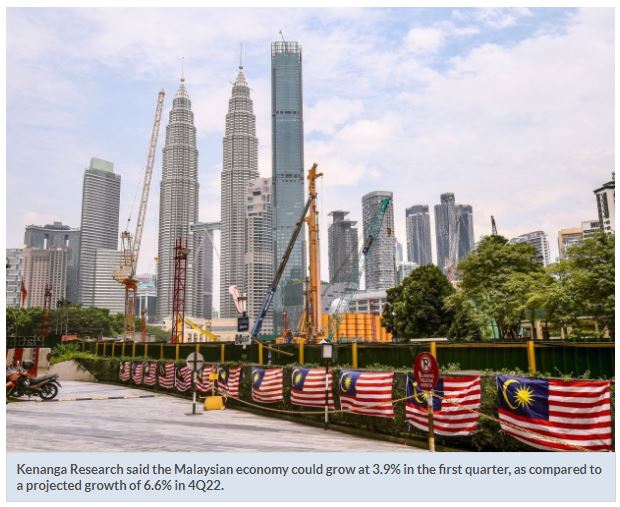Malaysia: Moderate growth forecast for Q1
PETALING JAYA: The economy is likely to kickstart the year at a sluggish pace, even as Malaysians continue to feel the brunt of stubbornly high inflation.
The ringgit is also forecast to weaken against the US dollar in the first quarter of 2023 (1Q23), amid the expected further rate hike by Bank Negara.
In a note yesterday, Kenanga Research said the Malaysian economy could grow at 3.9% in the first quarter, as compared to a projected growth of 6.6% in 4Q22.
It added that the impact of the global economic slowdown would pare down Malaysia’s overall gross domestic growth for 2023 to a projected 4.3%, down from 8.6% in 2022.
This is mainly due to weaker external demand and waning discretionary spending as cost of living rises.
Kenanga Research cautioned that the global slowdown will likely drag Malaysia’s export performance and commodity prices.
The economy will also be weighed down by the threat of rising inflation, which could trigger further financial tightening on the back of Bank Negara’s overnight policy rate (OPR) hikes.
Headline and core inflation are forecast to average at 2.5% and 2.3% respectively in 2023.
The central bank is expected to raise the OPR by 25 basis points to 3% in January, but Kenanga Research thinks there is a chance for this to be the last round of hikes.
“Nevertheless, we see the downside risk on growth to be limited, given the lower political risk premium following the outcome of the Unity Government formation, and resilient private spending backed by various policy support such as the continuation of subsidies and cash transfer programmes for the bottom 40% (B40) group, as well as the positive impact of China’s relaxation of its zero-Covid policy.
“In addition, the gradual pick-up in tourist arrivals will continue to support the recovery in the tourism sub-sector and further improve the labour market condition, especially in the services sector,” stated the research house.
Amid the challenges, Kenanga Research pointed out that the country’s fiscal support and China’s reopening prospect could limit the downside to growth.
“External downside risks to Malaysia’s growth remain, arising mainly from ongoing concerns about a recession in the United States amid a hawkish Federal Reserve (Fed), as well as ongoing geopolitical tensions and a worsening energy crisis in Europe.
“Besides, surging Covid-19 cases in China could also spark fears about the emergence of new Covid-19 variants or sub-variants.
“Nonetheless, China’s policy switch may eventually support growth going forward,” according to the research house.
Commenting on the ringgit’s performance against the greenback, Kenanga Research said the ringgit is expected to reverse the gains made in 4Q22 and depreciate against the US dollar to around the RM4.48 exchange rate level by end-1Q23.
This is mainly due to the increasing monetary policy divergence between Bank Negara and the Fed, as the latter may continue to hike above 5% while the former could stop short of 3%.
“However, moving into 2Q23, the eventual reopening of China, and increasingly pro-investor policies by Malaysia’s new government, may help to boost the ringgit back to around the RM4.35 level.
“Moving forward, the local note may continue to gain ground against the US dollar and strengthen to around the RM4.11 level by end-2023, primarily due to the Fed’s potential easing bias coupled with a potential rebound in commodity prices,” it added.
Source: https://www.thestar.com.my/business/business-news/2023/01/06/moderate-growth-forecast-for-q1


 English
English




